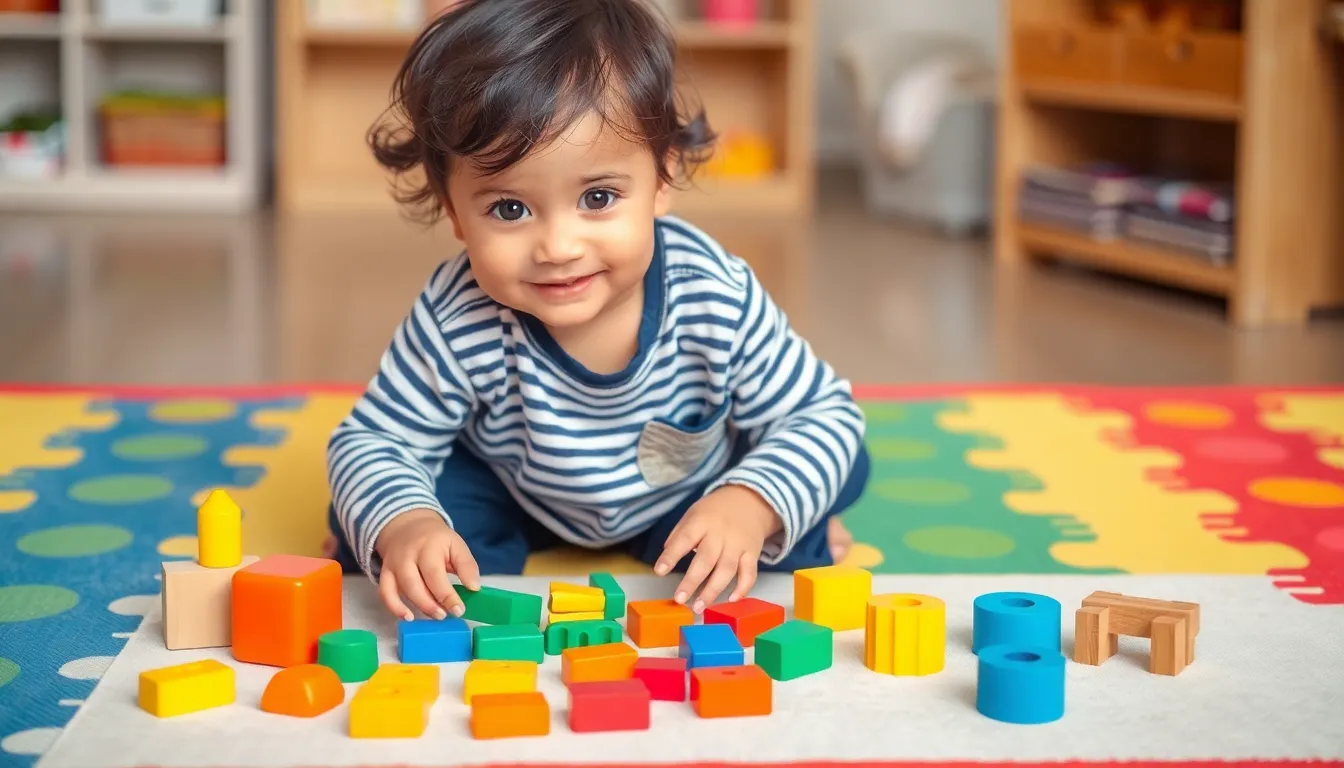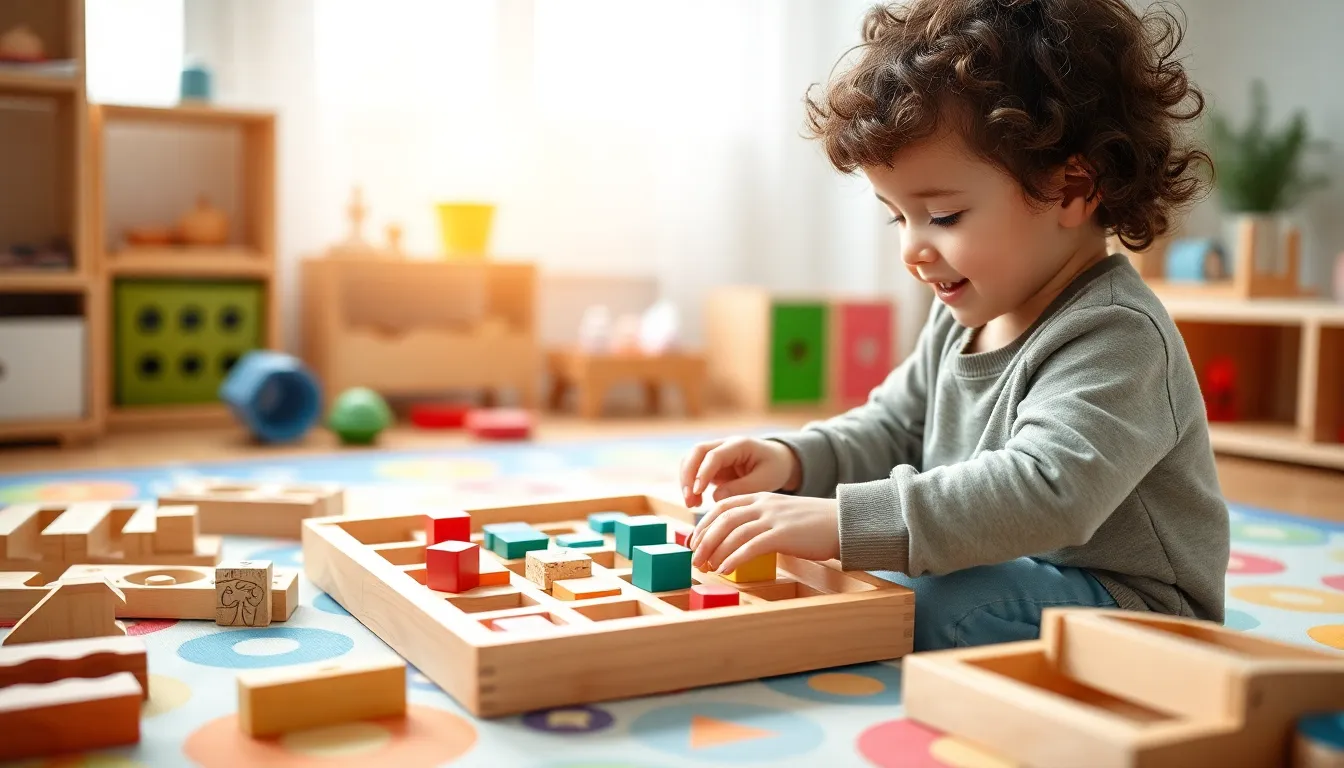Table of Contents
ToggleIn a world where kids are bombarded with flashy screens and endless distractions, Montessori sorting toys offer a refreshing breath of fresh air. These charming little tools not only engage young minds but also lay the groundwork for essential skills like critical thinking and fine motor development. Who knew sorting could be so much fun?
Overview of Montessori Sorting Toys
Montessori sorting toys engage children in meaningful play. These toys consist of various shapes, colors, and sizes, fostering sorting skills. Each toy helps develop critical thinking and fine motor skills while keeping kids entertained.
Children learn through hands-on experiences. Sorting toys encourage them to categorize objects by attributes. They discover patterns while enhancing visual discrimination. Parents often appreciate the educational value these toys bring to playtime.
Materials used in Montessori sorting toys are typically safe and durable. Wood, felt, and plastic are common choices, ensuring they withstand wear and tear. Each design emphasizes simplicity, allowing children to focus on the task at hand.
Numerous benefits arise from using Montessori sorting toys. They promote independence and decision-making as children choose how to sort. Engagement with these toys leads to improved concentration and patience over time.
The variety of Montessori sorting toys includes puzzles, stacking games, and sorting trays. Each type presents unique challenges that cater to different developmental stages. Choosing the right toy can enhance a child’s learning experience and support their growth.
Parents and educators often find these toys effective in classrooms and homes. By integrating sorting toys into play, children gain essential skills while having fun. Investing in Montessori sorting toys contributes to a holistic approach to early childhood development.
Benefits of Montessori Sorting Toys

Montessori sorting toys provide numerous advantages that enhance a child’s learning experience. These toys engage young minds while fostering essential skills through play.
Cognitive Development
Sorting toys facilitate cognitive development by encouraging children to categorize and organize objects. Kids identify similarities and differences among colors, shapes, and sizes. When they engage in sorting activities, they develop critical thinking skills and spatial awareness. Through exploration, they learn to make connections between different categories. Children demonstrate improved problem-solving abilities as they navigate sorting challenges. The hands-on experience allows them to grasp abstract concepts easily. Long-term benefits include enhanced memory and the ability to process information efficiently.
Fine Motor Skills
Fine motor skills benefit significantly from the use of Montessori sorting toys. These toys require children to manipulate small objects, promoting hand-eye coordination. Kids grasp, lift, and place pieces, which strengthens their hand muscles. Improvements in dexterity allow them to perform everyday tasks more effectively. When children engage with sorting activities, they refine their pinching and gripping techniques. These skills are vital for later tasks like writing and self-care. Engaging with various textures and shapes further boosts tactile awareness. Overall, Montessori sorting toys foster the development of precise motor skills essential for early learning.
Types of Montessori Sorting Toys
Different types of Montessori sorting toys cater to various developmental needs. These toys engage children in meaningful learning experiences while fostering essential skills.
Wooden Sorting Toys
Wooden sorting toys offer durability and aesthetic appeal. These toys come in various shapes, colors, and sizes, enhancing children’s visual discrimination. Children manipulate wooden blocks or shapes, which encourages fine motor skill development. The natural texture of wood provides tactile stimulation, improving sensory awareness. Examples include shape sorters and stacking toys, each designed to promote independent play and problem-solving skills. Additionally, wooden toys align with the Montessori philosophy of simplicity, focusing on engaging children’s attention without unnecessary distractions.
Fabric Sorting Toys
Fabric sorting toys present a soft, tactile alternative to wooden options. Typically made from natural materials, these toys engage children through textures and colors. Identifying different patterns or colors becomes an interactive experience when children sort fabric pieces. Activities involving these toys foster creativity and imagination in play. Common examples include fabric sorting bags and color-matching games, where children classify objects based on attributes. These toys also promote sensory exploration, allowing children to engage with various textures while developing their sorting skills in a safe, enjoyable manner.
Choosing the Right Montessori Sorting Toy
Selecting a suitable Montessori sorting toy involves considering age appropriateness and safety. Both factors play an essential role in ensuring a positive and effective learning experience.
Age Appropriateness
Choosing toys based on age ensures that children engage with appropriate challenges. Toys designed for infants emphasize simple shapes and vibrant colors, stimulating visual recognition. Toddlers benefit from toys that involve basic sorting and matching activities, aiding in their growing understanding of categories. Preschoolers thrive with more complex options, like puzzles or sorting trays that introduce additional elements and strategies. Each toy offers specific benefits aligned with developmental milestones, laying a strong foundation for future learning.
Safety Considerations
Ensuring safety is a top priority when selecting Montessori sorting toys. Materials must be non-toxic and free from harmful substances, protecting children during play. Wooden toys typically offer great durability, but they should be sanded smooth to prevent splinters. Toys with small parts require close supervision to avoid choking hazards. Furthermore, soft fabric toys provide a safer alternative, allowing tactile exploration without risk. Always checking for safety certifications guarantees quality control, assuring parents and caregivers of the toy’s reliability.
Montessori sorting toys stand out as exceptional tools for fostering early childhood development. They not only captivate children’s attention but also support essential skills like critical thinking and fine motor development. By engaging with these toys, kids learn to categorize and organize objects while enjoying meaningful play.
The variety of options available ensures that there’s something suitable for every developmental stage. Parents and educators alike can feel confident in choosing these toys, knowing they promote independence and enhance cognitive abilities. Ultimately, Montessori sorting toys create a safe and enriching environment that encourages exploration and learning through play.





